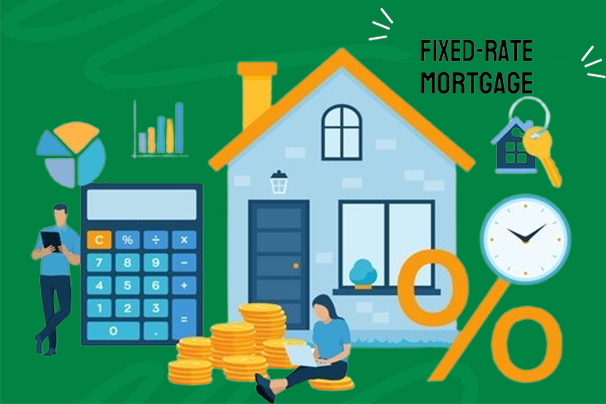A fixed-rate mortgage is a type of home loan where the interest rate remains the same for the entire term of the loan, providing predictability and stability in monthly payments. This can be advantageous for homeowners who prefer consistency in their budgeting and want to avoid fluctuations in their mortgage payments due to changes in interest rates.
Fixed-rate mortgages are typically available in various term lengths, such as 15, 20, or 30 years, allowing borrowers to choose a repayment schedule that aligns with their financial goals and capabilities. When considering a fixed-rate mortgage, borrowers need to assess their long-term financial plans and evaluate whether the predictability of fixed payments outweighs the potential benefits of adjustable-rate mortgages during periods of low-interest rates.

While fixed-rate mortgages may initially have slightly higher interest rates compared to adjustable-rate options, they offer stability and protection against rising interest rates over time. Additionally, fixed-rate mortgages provide peace of mind to homeowners by eliminating the uncertainty associated with fluctuating monthly payments, making them a popular choice for individuals seeking financial security and consistency in their housing expenses.
How a Fixed-Rate Mortgage Works
A fixed-rate mortgage works by maintaining a constant interest rate throughout the entire term of the loan, providing borrowers with predictability and stability in their monthly payments. Unlike variable-rate loans, where the interest rate fluctuates with market conditions, fixed-rate mortgages assure borrowers that their payments will remain the same regardless of changes in interest rates.
Borrowers who prefer consistency and long-term financial planning often opt for fixed-rate mortgages due to the predictability they offer. Fixed-rate mortgages are popular because they eliminate the uncertainty associated with fluctuating interest rates, allowing borrowers to budget effectively and plan for other financial obligations.
While fixed-rate mortgages provide stability and protection against rising interest rates, they may have slightly higher initial interest rates compared to adjustable-rate options. Borrowers should consider their financial goals and the current interest rate environment when deciding between fixed-rate and adjustable-rate mortgages to ensure they choose a loan that aligns with their preferences and financial circumstances.
Fixed-Rate Mortgage Terms
Fixed-rate mortgages offer borrowers the option of a fixed interest rate and payment over the life of the loan, with terms typically ranging from 10 to 30 years. While a 30-year fixed-rate mortgage is the most common option, shorter terms like 15 or 20 years are also available, allowing borrowers to pay off their homes faster and build equity more quickly.
The main advantage of a fixed-rate mortgage is the stability it provides in monthly payments, making budgeting easier for homeowners. Fixed-rate mortgages fully amortize over the term of the loan, meaning that after making on-time monthly payments for the specified period, the mortgage will be fully paid off.
Initially, fixed-rate mortgages may have slightly higher rates compared to adjustable-rate mortgages, but they offer predictability and consistency in payments throughout the loan term. Borrowers can choose between various loan terms based on their financial goals and preferences, with options ranging from 10 to 30 years.
Differences Between Fixed-Rate Mortgages and Adjustable-Rate Mortgages
Fixed-rate mortgages have a constant interest rate throughout the loan term, ensuring fixed monthly payments, making budgeting easier, and providing predictability. In contrast, adjustable-rate mortgages (ARMs) have interest rates that can change based on broader market trends, offering lower initial rates but the potential for fluctuations over time. Fixed-rate mortgages are straightforward and protect borrowers from sudden interest rate increases, but they may have higher rates initially and require refinancing to benefit from lower rates.
Adjustable-rate mortgages start with lower initial rates that can adjust periodically after an initial fixed period, offering flexibility but also the risk of increasing payments over time. ARMs are tied to indexes and margins, with adjustments based on market conditions, making them more complex than fixed-rate mortgages.
While ARMs can be advantageous for those planning to move before the fixed period ends or in a declining interest rate environment, they carry the risk of higher payments if rates rise significantly. Ultimately, the choice between fixed-rate and adjustable-rate mortgages depends on individual financial goals, risk tolerance, and housing plans.
Pros and Cons of Fixed-Rate Mortgages
Pros:
- Predictability: Fixed-rate mortgages offer stability with a constant interest rate throughout the loan term, ensuring predictable monthly payments.
- Budgeting Ease: Borrowers benefit from knowing exactly how much interest they will pay over the loan term, simplifying financial planning and budgeting.
- Protection against Rate Increases: These mortgages shield borrowers from rising interest rates, providing security against unexpected payment hikes
- Variety of Terms: Lenders offer various term lengths, such as 15, 20, or 30 years, allowing borrowers to choose a repayment schedule that suits their financial goals
Cons:
- Higher Initial Rates: Fixed-rate mortgages may have slightly higher initial interest rates compared to adjustable-rate options, potentially resulting in increased upfront costs
- Inflexibility in Rate Changes: Unlike adjustable-rate mortgages, fixed-rate loans do not benefit from falling interest rates without refinancing, limiting potential savings if rates decrease
- Reduced Flexibility: Higher monthly payments and limited ability to take advantage of lower rates can make fixed-rate mortgages less flexible than adjustable-rate options
- Accumulated Interest: Over the life of the loan, borrowers may pay more in interest compared to adjustable-rate mortgages due to the long-term stability provided by fixed rates
FAQs
Will my Fixed-Rate Mortgage Payment fluctuate throughout the life of the loan?
Fixed-rate mortgages maintain a constant interest rate, ensuring that monthly payments remain stable over the loan term.
What is private mortgage insurance (PMI), and how does it benefit me?
Private mortgage insurance (PMI) protects lenders in case borrowers default on their loans, allowing individuals to secure a mortgage with a lower down payment.
How will my taxes be paid? What is an escrow account? Why do I need one?
Taxes are often paid through an escrow account, where a portion of each mortgage payment goes towards property taxes and insurance, ensuring these expenses are covered when due.
How long will it take to close my loan?
The time to close a loan can vary but typically ranges from 30 to 45 days, depending on factors like the lender’s processes and the complexity of the transaction.
Should I choose a fixed-rate or an adjustable-rate mortgage?
The choice between fixed-rate and adjustable-rate mortgages depends on individual preferences for stability and predictability versus potential initial cost savings and flexibility in payments.
